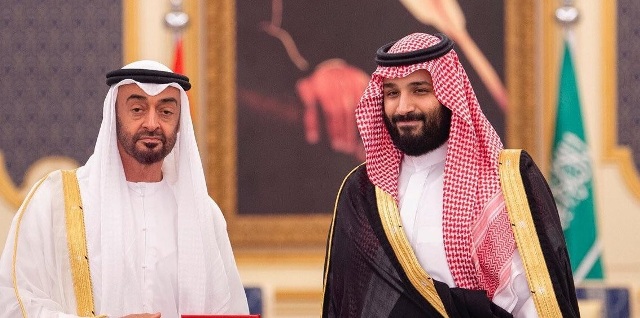By Dr Zakir Hussain
The intricate landscape of international politics often gives rise to intense rivalries among nations, and one such rivalry that has captured attention is the ongoing power struggle between Saudi Arabia and the United Arab Emirates (UAE). These two Middle Eastern giants, known for their opulent wealth and strategic significance, have been engaged in a multifaceted competition spanning across economic, technological, and geopolitical domains. This rivalry not only reflects their ambitions for regional dominance but also underscores the complex dynamics at play in the Middle East.
Economic Ambitions and Sports Diplomacy
Both Saudi Arabia and the UAE recognize the influence that hosting world-renowned sporting events can wield on the global stage. The push for top-tier soccer events like the FIFA World Cup and the organization of Formula 2 races showcases their intent to promote international recognition and draw global attention to their countries. These events not only stimulate their economies but also position them as entertainment hubs in the region.
Space Exploration and Technological Advancement
The rivalry extends beyond terrestrial matters into the realm of space exploration. Both nations are keen on launching satellites and sending astronauts into space, each eager to demonstrate their scientific and technological prowess. Their ambitions highlight the desire to establish themselves as spacefaring nations, capable of technological feats that extend beyond their borders.
Two Poles of Islam
Being the birthplace of Islam, Saudi Arabia enjoys a natural advantage in Muslim world. However, the UAE is not ready to accept it as a second in the Muslim world. Thus, it has promoted itself as a champion of moderate Islam, promoting all kinds of freedom in Dubai along with the permission to build religious places for the expatriates. This has seriously influenced Riyadh as well. This is visible in the luxury Giga projects where the Saudi authorities would apply liberal rules and regulations, including permission to enjoy all sorts of freedom there.
Energy Transition and Sustainability
As the world shifts toward greener energy alternatives, Saudi Arabia and the UAE have also embraced the pursuit of renewable energy sources, such as green hydrogen. Recognizing the global importance of sustainability, they are investing in cleaner energy solutions while reducing their reliance on traditional fossil fuels. These initiatives not only align with international environmental goals but also contribute to diversifying their economies for long-term stability.
Geopolitical Maneuvering and Influence
The rivalry between Saudi Arabia and the UAE takes on a more ominous tone when examining their geopolitical ambitions. The two nations vie for influence across the Middle East, engaging in intricate diplomatic relationships and alliances. Their interests often converge and diverge, leading to a complex web of partnerships and rivalries that ripple through the region.
Destabilization and Proxy Conflicts
The most troubling aspect of this rivalry lies in the potential for destabilization. Both nations seek to exert influence over various countries within the Middle East and North Africa, often through indirect means. Proxy conflicts, supporting opposing factions, and funding militant groups have been alleged strategies, raising concerns about their impact on regional peace and security.
Conclusion
The rivalry between Saudi Arabia and the UAE embodies the intricate dance of power, ambition, and competition that characterizes the international stage. While both nations strive to assert their dominance in various sectors, their actions hold the potential to shape the course of regional dynamics and beyond. As they vie for supremacy in space exploration, renewable energy, sports diplomacy, and geopolitical influence, the world watches closely, hoping that their ambitions will ultimately lead to cooperation rather than further instability. The Middle East’s future hinges on the choices made by these two influential nations and their ability to balance their competitive desires with the need for regional stability and cooperation.



Tribal mentality can never change
Mr John, Jesus also born in between them :). But Jesus(peace be upon him) and surrounding tribal spread the message of One God with peace and humanity, they didn’t not carry homicide weapons like man made gods.